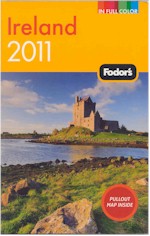 |
|
|
| ||||||
|
|
This page is the original source of this review, though you may also find it on Amazon or other sites. | ||
| Book Reviews Home | Free Audio Books | |
 |
Book Review of: Fodor's Ireland 2011
Price:
$16.31 Availability: Usually ships
within 24 hours |
| Review
of
Fodor's Ireland 2011, by Author (Softcover, 2010) (You can print this review in landscape mode, if you want a hardcopy) Reviewer: Mark Lamendola, author of over 6,000 articles. Fodor's, known for its amazingly detailed and accurate travel guides does it yet again. With an enormous number of beautiful full color photos, pull-out map in the back, detailed drilldown locale maps throughout, detailed descriptions, and lively tone, this guide makes the reader feel as if you're already in Ireland. Not only that, it's a complete reference for the traveler to Ireland. It seems Fodor's has covered every important detail, and then some. Not only will the book help you with a general visit to Ireland, it drills down into each locale so you can make the most of a visit to any part of the country. This book consists of 12 chapters occupying 693 pages, plus an extensive index and an appendix titled "Travel Ireland" (great tips for travelers on all of the important subjects). The chapters break down as follows:
Chapter 1. Experience Ireland. This provides a good overview of what Ireland has to offer tourists, so you can plan your itinerary to make the most of your trip. It also contains some tips on such things as finding a place to stay, local transportation, stretching your dollar, and staying safe. The next ten chapters each provide quite a bit of information on a particular locale or destination.
The final chapter is for golfers. Chapter 12. The Best Irish Greens. Even if you don't plan to visit Ireland, you might want to get this book for its breathtaking photos alone. If you do plan to visit Ireland, don't do that without Fodor's Ireland. | |
About these reviewsYou may be wondering why the reviews here are any different from the hundreds of "reviews" posted online. Notice the quotation marks? I've been reviewing books for sites like Amazon for many years now, and it dismays me that Amazon found it necessary to post a minimum word count for reviews. It further dismays me that it's only 20 words. If that's all you have to say about a book, why bother? And why waste everyone else's time with such drivel? As a reader of such reviews, I feel like I am being told that I do not matter. The flippancy of people who write these terse "reviews" is insulting to the authors also, I would suspect. This sound bite blathering taking the place of any actual communication is increasingly a problem in our mindless, blog-posting Webosphere. Sadly, Google rewards such pointlessness as "content" so we just get more if this inanity. My reviews, contrary to current (non) standards, actually tell you about the book. I always got an "A" on a book review I did as a kid (that's how I remember it anyhow, and it's my story so I'm sticking to it). A book review contains certain elements and has a logical structure. It informs the reader about the book. A book review may also tell the reader whether the reviewer liked it, but revealing a reviewer's personal taste is not necessary for an informative book review. About your reviewer
About reading styleNo, I do not "speed read" through these. That said, I do read at a fast rate. But, in contrast to speed reading, I read everything when I read a book for review. Speed reading is a specialized type of reading that requires skipping text as you go. Using this technique, I've been able to consistently "max out" a speed reading machine at 2080 words per minute with 80% comprehension. This method is great if you are out to show how fast you can read. But I didn't use it in graduate school and I don't use it now. I think it takes the joy out of reading, and that pleasure is a big part of why I read. |
| |||||